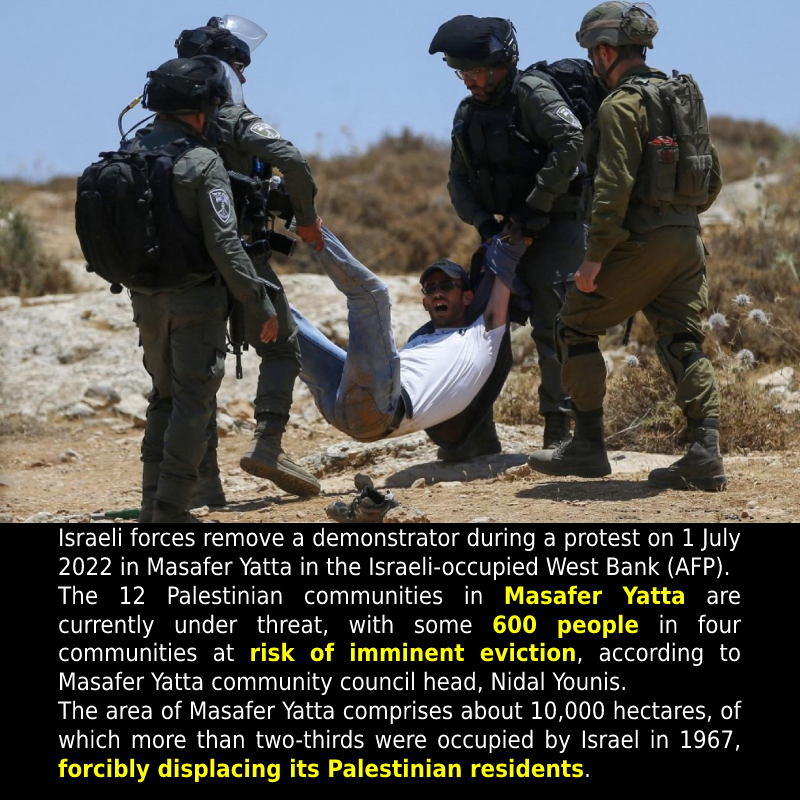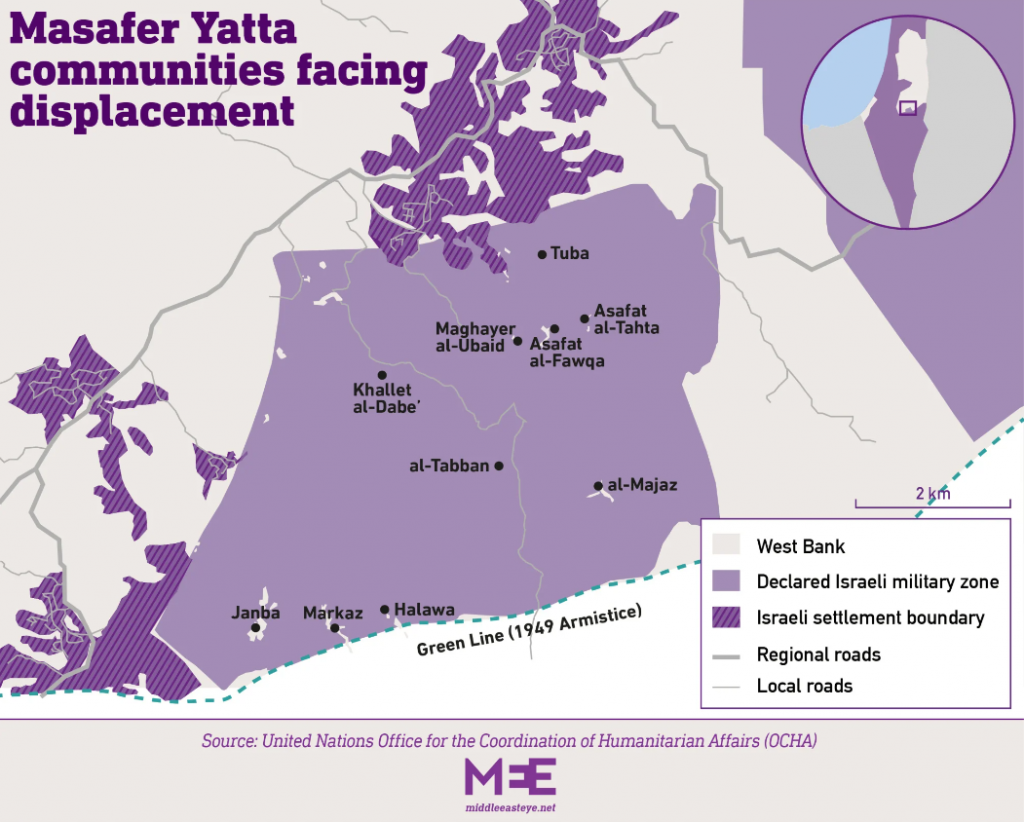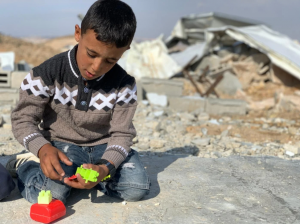By Oscar Rickett.

The Israeli human rights group B’tselem has called on the International Criminal Court (ICC) to urgently intervene to stop Israel from expelling Palestinians from their homes and land in Masafer Yatta, south of Hebron in the occupied West Bank.
B’tselem wrote to ICC Prosecutor Karim Khan on Monday because they want the Netherlands-based court to “do a preventative intervention, to stop Israel from committing a war crime,” Dror Sadot, the group’s spokesperson, told Middle East Eye.
Israeli authorities plan to evict some 1,000 Palestinian inhabitants of Masafer Yatta, a rural area in the South Hebron Hills, in order to create a military “firing zone”, or training ground for Israeli forces.
‘After the Israeli supreme court ruling it is clear that the Israeli judges are also responsible for those violations and are part of the apartheid mechanism’
– Dror Sadot, B’tselem
Eight villages, including four schools, clinics and hundreds of other structures in the area are set to be demolished.
The forcible transfer of residents in occupied territory is a violation of the Fourth Geneva Convention and the Rome Statute, the treaty that established the ICC.
After decades of legal wrangling, Israel’s supreme court paved the way for the razing of the villages in May, when it rejected a petition against the eviction of the residents.
David Mintz, a supreme court judge, wrote that the Palestinian petitioners had not successfully proved they had lived in the villages as permanent residents before the army declared the area a training zone in the early 1980s.
“Since then, Israel has escalated its actions – in scope, severity and frequency – against those communities, pushing them out of their homes,” Sadot said.
Speaking about why B’tselem had chosen to write to the ICC, Sadot pointed to the court’s 2018 intervention regarding the West Bank community of Khan al-Ahmar, which Israel was set to raze.
The ICC warned Israel that destroying Khan al-Ahmar would be a war crime. The community is intact, though the threat of expulsion has not gone away as legal deliberation in Israel over the demolition is still ongoing.
“This is the first time B’tselem has directly asked the ICC for preventative intervention,” Sadot said. “After the Israeli Supreme Court ruling it is clear that the Israeli judges are also responsible for those violations and are part of the apartheid mechanism. International intervention is a must.”
Omar Shakir, Israel and Palestine director at Human Rights Watch, told MEE that the residents of Masafer Yatta “face the chilling prospect that at any moment Israeli bulldozers could show up to raze their long-time homes and community because they are Palestinian living in an area Israel desires.
“Tepid statements didn’t stop the bulldozers that have razed thousands of Palestinian homes over the years and won’t stop the ones coming for Masafer Yatta,” Shakir said.
“It is only the prospect of concrete action that has the chance to do so. The ICC prosecutor should play his part to end the impunity that fuels Israel’s apartheid and grave abuses against Palestinians.”
Following the supreme court’s ruling in May, lawyers representing the residents of Masafer Yatta filed a petition challenging the demolitions. This was rejected in August.
“Israel wants to kick us out and they’ll do anything to make it happen,” Sami Huraini, a local activist, told Middle East Eye at the time.
Decades of struggle
Masafer Yatta, which borders the Green Line, is home to several herding communities that live in small hamlets across its rocky, hilly terrain.
In the 1980s, about 3,000 hectares of the area’s land, encompassing 12 villages, was declared a military firing zone, with the Israeli military seeking to remove residents from it. It was subsequently declared Firing Zone 918.

In 1999, the army forcibly expelled around 700 residents of Masafer Yatta from their homes after declaring that they were living “illegally” in a firing zone.
The residents petitioned the Israeli Supreme Court soon after the expulsion, which initiated an interim injunction that allowed them to return to their homes, but banned any new construction or development in the area.
Since then, the area’s residents have been locked in a legal battle with the Israeli authorities, one that was dealt a severe blow by the Supreme Court’s May ruling and August rejection.

‘I keep having dreams that the [Israeli] army has come back and destroyed our house again,’ Adham, eight, says (MEE/Shatha Hammad)
READ MORE: Masafer Yatta: A Palestinian community under pressure
The Palestinian inhabitants of the area are threatened regularly by Israeli soldiers and settlers, and have been living in a state of constant uncertainty over their future for decades.
The Israeli military has used live fire and driven armed vehicles through the area as part of what it presents as “training”.
In September 2021, close to 100 masked Israeli settlers invaded the Masafer Yatta village of Khirbat al-Mufkara, injuring a dozen Palestinians, including a three-year-old boy who was hit by a stone thrown at him while he was asleep inside his home.
The United Nations this year condemned Israel’s “harassment” of human rights defenders and humanitarian workers in the villages of Masafer Yatta.
“Israeli authorities’ hubris is proving without limits. They are even harassing human rights defenders and humanitarian workers seeking to support and protect people facing grave human rights violations in Masafer Yatta,” four UN experts said in August.
Source: Middle East Eye. 7 October 2022